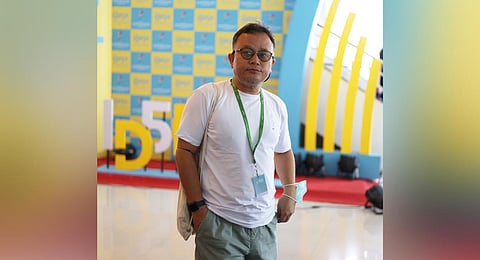‘Nobody knows what’s happening in Manipur’
KOCHI: The 15th International Documentary and Short Film Festival of Kerala (IDSFFK) shone the spotlight on the remarkable stories of women in sports from the northeast as National Award-winning filmmaker Haobam Paban Kumar took centre stage with his 26-minute documentary, ‘Iron Women of Manipur’.
In the moving tribute, Haobam captures the grit and resilience of legendary women weightlifters of his home state such as N Kunjarani Devi, Anita Chanu and, of course, Mirabai Chanu. Haobam, a familiar face at IDSFFK, says ‘Iron Women of Manipur’ was conceived after Mirabai clinched silver at the Tokyo Olympics.
“She was conquering the dream of two pioneering women weightlifters, Anita and Kunjaranii. They see themselves in Mirabai. In a way, the film shows how a person’s dream becomes the dream of the whole state,” he says.
“These women were not from well-off backgrounds. They took up sports for different reasons, including securing a job to support their families and empowering themselves in society. Now, people from every section are enrolling their children in sports. I hope this documentary inspires more women to take up sports.”
A pall of gloom descends on his jubilation as he reflects on the ongoing ethnic conflict in his homeland. “The government has not effectively intervened in the matter; its presence is not felt even in the refugee camps. People in the area have lost trust,” rues Haobam.
“It is very disturbing, as there are many angles to the issues — drugs, migration, land issues, etc. Nobody knows what exactly is happening there. Being a person from the majority community, Meitei, it is perplexing for me — what to believe and what not to. Many people point out that the clash between Kukis and Nagas in 1990 lasted for four years. This might also take more time to end. I must say, the trust between the two communities (Kukis and Meitis) has gone. They are like partitioned lands.”
Notably, Haobam, 49, is popular in global film circles for his works on Manipur and its people. His storytelling prowess has earned him several accolades, including a National Award for his debut feature film ‘Lady of the Lake’, which delved into Manipur’s gun culture. “At a point in time, one who owned a gun was considered king there,” he recalls.
His filmography expanded with ‘Nine Hills, One Valley’ in 2021, exploring the devastating impact of the 1990 clashes between the Nagas and Kukis. “For the film, I interacted with many victims of the violent unrest,” he says. “My latest feature film is ‘Joseph’s Son’, which deals with ethnic clashes. I used an English name to avoid ethnic branding. Though I hail from the Meitei community, I prefer calling myself Manipuri.”
Looking back at his two-decade-long filmmaking journey, Haobam humbly says, “Luckily, right from the start, my films got noticed, and I got funds to make films.” An executive member of the Manipur State Film Development Society, Haobam calls IDSFFK a sanctuary for documentary enthusiasts. “Places like these give us hope, and may we have lots of similar fests in the future,” he says.
As boundaries between fiction and documentary blur, Haobam observes that modern documentaries must be engaging and accessible to wider audiences. “It is difficult to distinguish fiction from documentary nowadays,” he says.

